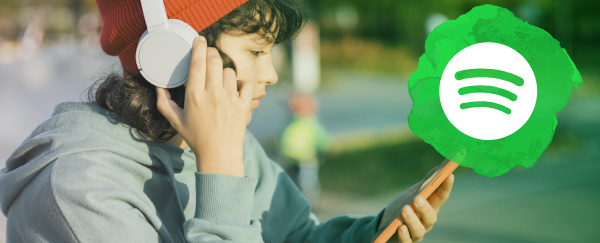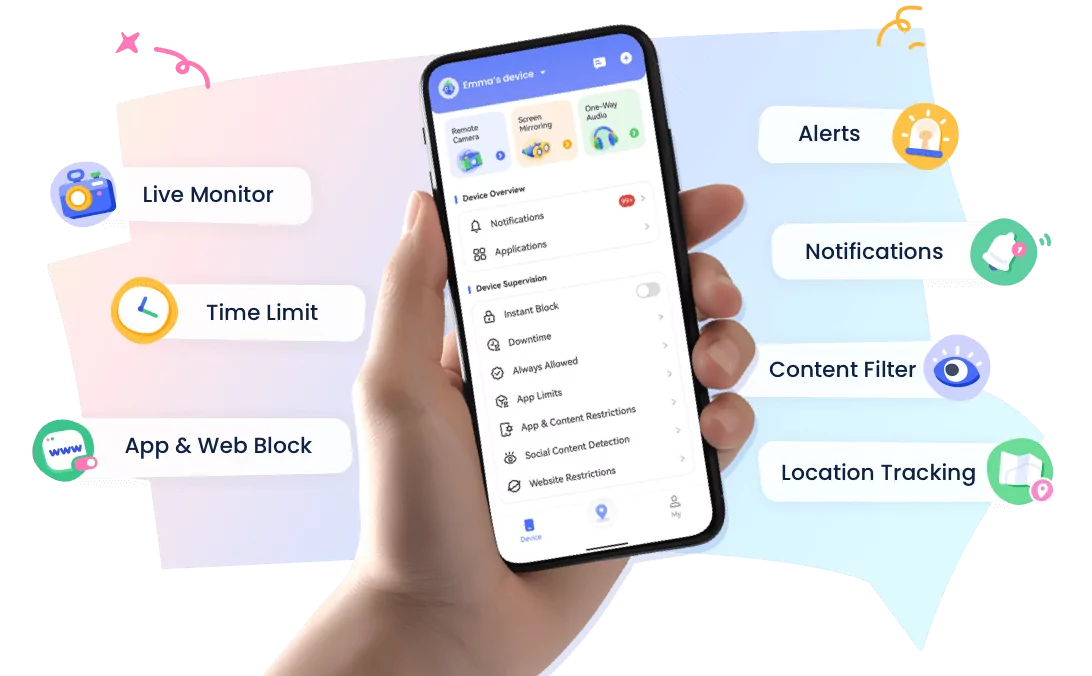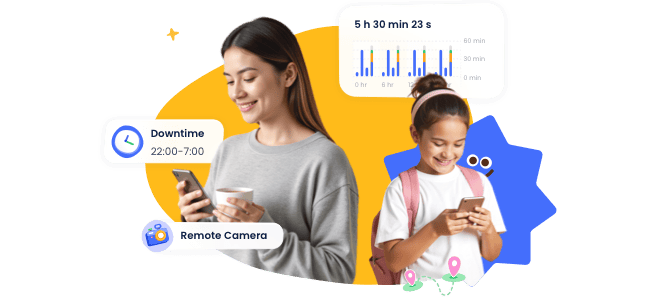Is Spotify safe for kids? Optimal Safety Guide for Parents

If there's one music service app that's popular among both teens and adults, it has to be Spotify.
According to a 2020 Statista's report, 48% of American teens actively use Spotify, and this number keeps growing. During these crucial years of character development, parents are concerned about potential exposure to explicit content, and the influence of music on their values.
The concern is natural. In fact, I would be more surprised if you were not concerned about your child using Spotify for longer hours. So, is Spotify safe for kids? Let's find out in the post.
How Much Do You Know about Spotify?
Spotify is designed for both music lovers and podcast listeners, offering a wide range of content that appeals to different audiences.
Spotify has a version for kids under 13 called Spotify Kids, where parents can manage and see what their kids are listening to. For teens 13 and up, Spotify offers built-in parental controls. To use either Spotify Kids or these parental controls, parents need to sign up for the Spotify Family plan.
However, if teenagers sign up for Spotify using the free tier, they will be exposed to a lot of ads and may hear content that is not appropriate for their age, which may cause concern for parents.
What Is the Minimum Age Requirement for Spotify?
In Spotify's official policy, only people over 13 can use it. Even though app stores like Google Play and the Apple App Store rate it as 12+, if you're 12, you won't be able to register successfully.
So what does that 12+ rating really mean? It suggests some content is not suitable for younger kids, like mildly mature or suggestive themes. But this doesn't mean teens 13 and up can just freely access everything. Instead, it's meant to guide parents so they know some content isn't fit for those under 12. For teens aged 13 and older, it's wise for parents to use their judgment and think about setting up parental controls to manage what can be accessed.
Also, make sure to check the minimum age requirement set by local laws before using the app, as these can vary from country to country.
What Does Spotify Do Well for Tweens?
As mentioned earlier, Spotify does have some content that may not be suitable for younger children or teens, it also provides measures to protect them from harmful content and influences. Here are a few aspects that I think are worthwhile:
Content Filter
Spotify itself has a content filtering feature. When enabled, it greatly reduces the likelihood of explicit content, including songs marked with an "E", appearing on recommendation pages and in search results.
Parental Controls in Family Plan
The Spotify Family Plan includes parental controls, allowing parents to directly enable content filters on their child's account. This significantly reduces the likelihood of children being exposed to explicit content.
Spotify Kids Version
One of the biggest advantages of Spotify Kids is its robust explicit content filtering, which is also human-curated. It also allows parents to view and manage what their children can listen to, providing peace of mind by reducing the risk of kids accidentally coming across inappropriate content.
No Direct Messaging Feature
Spotify doesn't include a direct messaging feature, which helps keep the platform focused on music and podcasts rather than social networking. This lack of DMs reduces distractions for teenagers and limits privacy concerns, making it a safer space without the risk of inappropriate interactions.
Limited Interaction Features
Unlike other popular social media apps, Spotify doesn't allow people to have conversations on the app. All it allows is to like, follow, or collect content. It is best in a way as it minimizes the interaction which makes a safe environment for both kids and teens.
Low Risk of Privacy Exposure
For Spotify, people's privacy is the first priority. It doesn't ask you to create a proper traditional social media profile to be on the app; otherwise, it just asks for an account, and you're all set. Due to a minimal profile and very few details given to the app, no one's privacy is at stake.
Things Parents Should Watch Out for on Spotify
While Spotify does a good job filtering explicit content and prioritizes user privacy, there are still some areas where parents need to be cautious:
Advertisements in the Free Version
In Spotify's free version, ads can really affect how teens experience the platform. These targeted ads might not always fit their interests or age group. Seeing lots of these ads can push teens toward buying things they don't need.
Limited Parental Controls
1. Parental controls are tied to the Spotify Family Plan, so you need that subscription to make it work. Without it, you don't have as much control over your kid's account.
2. With Spotify's parental controls, you can keep track of what your kids are listening to, but it won't give you a deep dive into their listening habits or how much time they're spending on the app.
3. While there's no direct messaging, Spotify does have social features like profile sharing and collaborative playlists. These aren't something you can manage with parental controls.
Algorithm Influence
Algorithm, most of the time, shares content based on the user's preferences. Whatever you've been listening to on the app will be shared, and all the other similar content will be shown to you as a recommendation.
Now, if you have a family account or your kid also uses your account, there might be chances for them to see the same content that the algorithm has recommended for you. This may include vulgar or adult content, too, depending on what you've been listening to so far.
Collaborative Playlists
Spotify’s Collaborative Playlists are a cool way for teens to share music, but there are a few downsides. Anyone with access can add or remove songs, which might lead to disagreements among friends. Plus, if playlists are shared with others, there's a chance that inappropriate songs could get added.
Explicit Content Accessibility
You can block explicit content, but it relies on how accurately artists and labels tag their songs. The app mainly uses general content labels, which might not cover all the age-appropriate concerns parents have. Occasionally, songs might not be labeled correctly or at all, letting some slip through. Also, even with the filter on, album covers with explicit images aren't blocked.
Hardcore Image Risks
As I mentioned earlier, album covers can be a concern for parents. There have been instances where Spotify had covers with explicit content, even though it's against their rules. Vice reported that some of this content is cleverly tagged with punctuation, like periods or commas, to slip past Spotify's detection. This means a curious child on a parent's phone might find these covers more easily than someone actively searching for them.
Ear Health and Listening Habits
Even if you turn on all the parental controls and filters on the app, there is still one concern left that is most crucial to discuss. It's about kids' ear health.
If they are using the app non-stop without any breaks and are getting addicted to it, you need to take care of their listening habits. Otherwise, they'll suffer from hearing loss problems soon.
Worried Your Child Is Spending Too Much Time on Spotify? Try AirDroid Parental Control
AirDroid Parental Control helps parents set time limits or downtime on Spotify and can even block the app completely with one click.
So, Is Spotify Safe for Kids? Any Safety Recommendations?
So, is Spotify safe for kids? Yes and No. Here's our view:
For kids 12 and under using Spotify Kids, it's safe.
For teens 13 and up who use Spotify with parental controls on, it's generally safe. However, parents shouldn’t completely step back—they should still keep an eye on what their kids are listening to.
For teens 13 and older using Spotify without parental controls, it's not considered safe.
While Spotify's parental controls create a safe zone for teens, it's still important to follow these safety steps:
Keep Explicit Content Filters On
Make sure those explicit content filters stay on to protect your kids from anything too vulgar.
Use Spotify Kids
If your child is under 12, definitely go for Spotify Kids. It's designed just for kids, with all the content naturally filtered to create a safer environment for young users.
Monitor Listening Habits
Stay engaged with what your child is tuning into. Ask what they've been listening to. This helps you see if they’re getting too hooked on the app and whether they're exposed to explicit content.
Set Listening Limits
Even if the account is designed for kids and you’re keeping an eye on it, setting time limits is key. Let them know how long they can use the app.
Explore Educational Content
It's not just about limits. Encourage your kids to check out educational content. Spotify has lots of educational podcasts and audiobooks that are great for young and adult minds. Find some gems and suggest them to your kids during their listening time.
Discuss Online Privacy
Kids need to learn basic online safety. Since they might not know the internet's risks, teach them how to use the app wisely and avoid shady accounts. It's part of your role as a parent.














Leave a Reply.